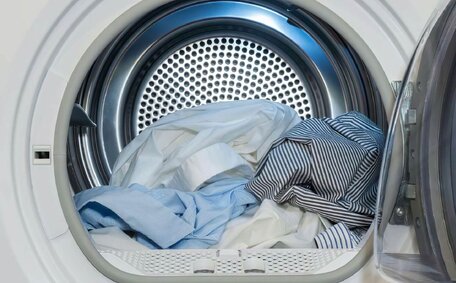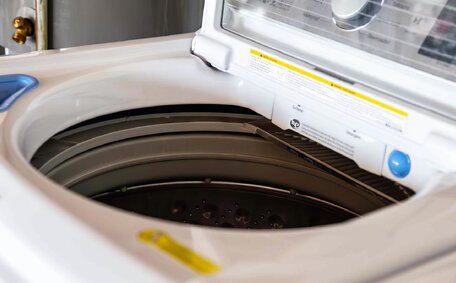What happens when you mix baking soda and vinegar?
Combining baking soda (sodium bicarbonate) with vinegar (acetic acid) triggers an acid-base reaction. During this process, the basic properties of baking soda react with the acetic acid in vinegar.
The hydrogen ions in the acetic acid from vinegar combine with the sodium and bicarbonate ions from baking soda. The result is carbonic acid, which quickly decomposes into carbon dioxide gas, water, and sodium acetate, causing fizzing.
This reaction is immediate at room temperature. Applying heat accelerates the dissociation of acetic acid, increasing reactivity and cleaning power. Heated mixtures of vinegar and baking soda can generate more carbon dioxide bubbles, enhancing the effectiveness of drain cleaning.
While baking soda has beneficial cleaning properties, its effectiveness can be compromised when neutralised by vinegar. However, utilising heat and physical agitation alongside this mixture can enhance its ability to dislodge stubborn dirt and stains.
Can baking soda and vinegar effectively unclog drains?
Vinegar and baking soda create a natural DIY solution for unclogging drains, especially effective for simpler blockages like those in shower heads and bathroom sinks. When combined in equal parts, you will witness soda vinegar react, leading to fizzing, indicative of carbon dioxide gas production and a baking soda clean effect. The ensuing agitation has the power to cut through and disperse gunk and grease buildup.
For sink cleaning, a tablespoon of baking soda added to vinegar, when heated, produces a vigorous fizz that aids in grime removal. Allowing the mixture to sit for a few minutes before rinsing can loosen debris and enhance cleaning.
Using baking soda and vinegar in a spray bottle is an eco-friendly approach to cleaning. Effective application can maintain clean drains and help prevent serious clogs.
Step-by-step instructions for using baking soda and vinegar to unclog drains
- Kick-start your clog-resolving venture by introducing a solution when you sprinkle baking soda and clean vinegar into the obstructed drain.
- Allow the baking soda white to sit briefly, then introduce white vinegar into the spray bottle and then spray vinegar into the drain for an amplified de-clogging effect.
- Boil water and pour it down the drain for an effective hot rinse.
- Carefully pour white vinegar down the drain to react with the clean baking soda. The warmth will initiate vigorous fizzing and will thoroughly clean your pipes.
- Permit the combination of baking soda and protective substances to interact for fifteen minutes, as it embarks on disrupting the accumulated debris, especially effective on stainless steel surfaces, with vinegar then leading the assault.
- Add a mixture of half a cup of baking soda and white vinegar to the drain, followed by warm water for optimal cleaning, ensuring the water temperature is below boiling.
- Pour the vinegar and let sit few minutes before the final rinse to interact with the baking soda and penetrate the clog.
- Flush the drain with hot water to clear out the dislodged debris, akin to using baking soda on blockages.
- Optional - Repeat steps 1-8 if drain remains clogged. Too much repetition may damage pipes.
- Finish by running cold water through the drain to rinse away any remaining residue.
The combination of hot liquid water with the clean vinegar and baking soda reaction generates bubbles and pressure that assist in dissolving clogs. Letting the mixture sit allows time for the ingredients to work before the flush water carries away debris cleared by the fizzing.
Caution: Although baking soda alone can mitigate basic clogs and reduce water stains, it may not overcome tough blockages without assistance. Avoid overuse to prevent pipe corrosion. Consider mechanical means like an auger if DIY options fail to breaks down the obstruction.
When should you avoid using baking soda and vinegar?
There are a few key situations when one should never use baking soda and vinegar for cleaning:
- On natural fibres like wool, silk, or suede, as the acidity can damage proteins in the fibres and weaken them over time.
- Avoid using the mixture in washing machines as it may cause colours to fade or change, particularly with regular use.
- In your laundry machine, a slow build-up of soda mixed with other substances might risk corroding the metal parts’ protective layers.
- With specific brands of laundry detergent, since these materials may negatively react and diminish the cleaning efficacy.
Individuals sensitive to scents can use a baking soda water solution as a milder cleaning alternative.
When it comes to versatility, while a baking soda vinegar can be a very useful cleaner for many surfaces in your home such as countertops, sinks, and tile, caution should be taken when dealing with more delicate items. Testing first in an inconspicuous area can help determine if these DIY ingredients may cause unwanted effects.
Are there better natural drain cleaners than baking soda and vinegar?
Certainly, Various natural alternatives can make your stove sparkle, with a baking soda paste being especially effective, sometimes surpassing vinegar’s cleaning abilities.
Enzymatic Drain Cleaners
Drain cleaners that contain hydrogen peroxide harness bacteria and enzymes to break down organic material, which includes elements like food, oils, grease, hair, and soap scum. Check out products like Bio-Clean and their formulation with natural enzymes and bacteria that gradually disintegrate pipe buildup; unlike severe chemicals, they don’t generate harsh chemical effects. They are safer for pipes than baking soda and vinegar but work slower, taking 12-24 hours to clear clogs in soda your plumbing.
Caustic Soda
Also called lye or sodium hydroxide, caustic soda is a high ph alkaline compound that can aggressively dissolve and essentially blow up blockages of grease, fats, oils, and even hair/skin. It effectively clears blocked drains but is a hazardous chemical requiring extreme caution. Consider professional use only.
Boiling Water
Boiling water can adeptly resolve minor sink obstructions by dissolving grease and cleansing the pipes.
Allow 10-15 minutes between each round when using vinegar, a safe but slower method due to the absence of chemical reactions.
Can overusing baking soda and vinegar damage pipes?
Yes, excessive use of baking soda and vinegar can damage pipes over time. Here’s why:
Corrosion
The high pH level of vinegar combined with baking soda can inadvertently contribute to pipe corrosion over time. Galvanised, copper and steel pipes are especially vulnerable. With more than repeated applications over time, the risk of corrosion escalates.
Pipe Blockages
Overusing baking soda and vinegar in drains can lead to a buildup of residue. Over time, this can solidify, resulting in clogged drains or diminished water flow.
Sealant Breakdown
Modern pipes often have protective sealant to improve flow and resist corrosion. However, frequent use of baking soda and vinegar can degrade these sealants. Damaged seals increase the risk of water contacting and corroding the underlying pipe material.
Using warm water is essential when applying baking soda and vinegar to effectively combat hard water stains and mineral build-up. Limit drain applications to once a month maximum, and thoroughly rinse pipes afterward with hot water. Seek professional drain cleaning if clogs persist beyond DIY efforts.
Professional vs. DIY drain cleaning with baking soda and vinegar
Baking soda and vinegar mixtures can be suitable for minor clogs, but persistent or severe blockages often require professional cleaning services.
For stubborn residue or standing water, augmenting baking soda and vinegar with commercial cleaners and tools, such as augers, can be effective. Professionals possess the expertise and equipment to clear blockages efficiently without damaging pipes.
Professionals carefully address obstructions within plumbing systems to restore flow, thus reducing the need for regular baking soda and vinegar use. They examine meticulously to find out what the root problems are, like pipe cracks or misalignment, and correct them to prevent future blockages. DIY cleaners struggle to address underlying issues.
DIY methods do play a small role, excellent for maintenance cleaning. They do not address challenges like corroded or collapsed drains, which require the effectiveness of vinegar and baking soda alongside professional intervention. Explore a plumber’s know-how for a severely blocked pipe even after initial attempts to use baking soda vinegar.






